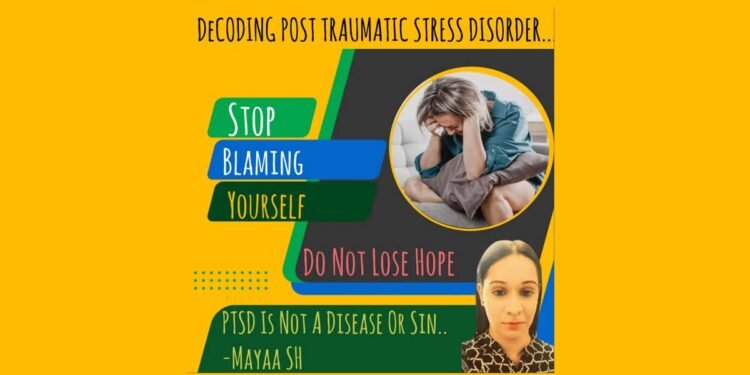Mayaa SH, an Indian poetess, essayist, and social activist is a vocal advocate for women’s empowerment and social justice, and she recognizes the challenges both men and women face regarding marriage and divorce. Her work emphasizes the importance of challenging outdated beliefs and fostering an environment where women can thrive, regardless of their marital status.Mayaa SH’s call to action urges citizens to support those going through any life altering moments, which is a critical step in mitigating the impact of trauma and promoting healing.Furthermore, Mayaa SH’s emphasis on empowering women to make choices about their lives, including the decision to leave a marriage, is crucial for healthier families and communities.This empowerment can be seen as a form of resilience-building, as it allows individuals to regain control over their lives and make choices that promote their well-being, which is essential for recovery from trauma.In a candid diving deep into the intricacies of mental health and trauma ,Mayaa SH endeavours to decipher the nuances of Betrayal Trauma and Post-Traumatic Stress Disorder (PTSD)..
Post-traumatic stress disorder (PTSD) is a mental health condition that can develop after experiencing or witnessing a traumatic event. These events can include serious accidents, violent assaults, natural disasters, or other life-threatening situations. Most people will experience some distress after a traumatic event, but the symptoms of PTSD persist for more than a month and significantly interfere with daily life.Post-traumatic stress disorder (PTSD) is a complex mental health condition that can develop after experiencing or witnessing a traumatic event.The impact of trauma can be profound, leading to a range of symptoms that can significantly disrupt a person’s life. Fortunately, effective treatments are available, and seeking professional help is a crucial step toward recovery.
Betrayal trauma, as described by Mayaa SH, involves a violation of trust by someone upon whom an individual depends for support, safety, or well-being, often leading to significant mental health challenges.This type of trauma uniquely disrupts attachment and trust, creating internal conflict and complicating the healing process.
The Nature Of Betrayal Trauma :
Betrayal trauma arises when a person’s trust is violated by someone or an institution they rely on for support, safety, or well-being. This violation can stem from various sources, including partners, family members, caregivers, or institutions like workplaces or healthcare systems.The core of betrayal trauma lies in the reliance on the betrayer, making it difficult for the victim to simply remove themselves from the situation. Mayaa SH’s work highlights the impact of betrayal trauma on mental health, particularly in the context of marital relationships.
Mental Health Impacts of Betrayal Trauma :
Betrayal trauma can significantly impact mental health, leading to a range of psychological and emotional challenges.These effects can manifest in several ways:
(1)Emotional Distress: Individuals may experience a wide range of intense emotions, including anger, sadness, confusion, fear, shame, and grief.
(2)Anxiety and Depression: Betrayal trauma can trigger symptoms of anxiety and depression, making it difficult to cope with daily life.
(3)Post-Traumatic Stress Disorder (PTSD): The experience can lead to symptoms of PTSD, such as intrusive thoughts, nightmares, hypervigilance, and flashbacks.
(4)Trust Issues: Betrayal can erode trust, making it difficult to form and maintain healthy relationships in the future.
(5)Altered Self-Perception: Betrayal can damage self-esteem, leading to feelings of shame, guilt, and self-blame.
(6)Dissociation: As a coping mechanism, individuals may dissociate or detach from their emotions and thoughts to cope with the trauma.
(7)Cognitive Difficulties: Betrayal trauma can affect concentration, decision-making, and memory.
(8)Physical Symptoms: The emotional distress can manifest physically, leading to headaches, fatigue, sleep disturbances, and digestive issues.
(9)Increased Risk of Mental Health Disorders: Betrayal trauma can increase the risk of developing diagnosable mental health disorders.
(10)Betrayal Blindness: This is a defense mechanism where individuals may unconsciously ignore or downplay signs of betrayal to maintain the relationship, particularly when dependent on the betrayer
Re-experiencing Symptoms :
The symptoms of PTSD can manifest in several ways, impacting a person’s thoughts, feelings, and behaviors.
Symptoms of PTSD :
The symptoms of PTSD are categorized into four main clusters: re-experiencing, avoidance, negative alterations in cognition and mood, and alterations in arousal and reactivity.These symptoms can vary in severity and presentation from person to person.
Avoidance Symptoms :
These experiences can be triggered by reminders of the trauma, such as specific places, people, or situations.
Flashbacks, nightmares, or intrusive thoughts related to the event.
Re-experiencing Symptoms involve reliving the Traumatic Event. This can include:
These behaviors can lead to social isolation and a disruption of daily routines.Avoiding places, people, or activities that trigger memories of the event.Avoiding thoughts or feelings associated with the trauma.
Avoidance Symptoms involve efforts to avoid reminders of the trauma. This can include:
(a)Negative beliefs about oneself or the world.
(b)Persistent negative emotions, such as fear, anger, or guilt.
(c)Loss of interest in previously enjoyed activities.
(d)These symptoms involve changes in thoughts and feelings. This can include:
(1)Negative Alterations in Cognition and Mood
(2)These symptoms involve changes in a person’s reactivity and arousal levels. This can include:
(A)Alterations in Arousal and Reactivity :
These changes can significantly impact a person’s sense of self and their ability to experience positive emotions.
(B)Diagnosis and Treatment :
These symptoms can lead to increased anxiety, difficulty managing emotions, and problems with daily functioning.
Being Easily Startled :
Irritability and angry outbursts :
Difficulty concentrating or sleeping.
A diagnosis of PTSD is made by a mental health professional based on a thorough evaluation of symptoms and their impact on daily life.The Diagnostic and Statistical Manual of Mental Disorders (DSM-5) provides the criteria for diagnosing PTSD, which include the presence of symptoms from each of the four symptom clusters for at least one month.
Several types of Psychotherapy have been shown to be effective in treating PTSD, including:
Psychotherapy :
Treatment for PTSD typically involves a combination of psychotherapy and medication.
Medication :
Cognitive Behavioral Therapy (CBT): This therapy helps individuals identify and change negative thought patterns and behaviors related to the trauma.
Exposure Therapy:
This therapy involves gradually exposing individuals to trauma-related memories and reminders in a safe environment to reduce fear and anxiety.
Eye Movement Desensitization and Reprocessing (EMDR):
This therapy uses eye movements or other bilateral stimulation to help process traumatic memories.
Risk Factors and Prevalence :
Certain medications, such as selective serotonin reuptake inhibitors (SSRIs) and serotonin-norepinephrine reuptake inhibitors (SNRIs), can help manage symptoms of PTSD, such as depression, anxiety, and sleep disturbances.
Exposure To A Traumatic Event :
(1)Previous trauma experiences, especially during childhood.
(2)Lack of social support after the event.
(3)Pre-existing mental health conditions.
(4)PTSD can affect anyone, but certain factors can increase the risk of developing the condition. These include:
The prevalence of PTSD varies depending on the population and the type of trauma experienced. It is estimated that approximately 3.9% of the world population has experienced PTSD at some point in their lives.Women are more likely to develop PTSD than men.
Medication :
Medications can be helpful in managing PTSD symptoms, particularly when combined with psychotherapy. The U.S. Food and Drug Administration (FDA) has approved certain medications for PTSD, and others may be prescribed off-label.
Selective Serotonin Reuptake Inhibitors (SSRIs): Fluoxetine (Prozac), paroxetine (Paxil), and sertraline (Zoloft) are commonly prescribed SSRIs for PTSD.
Serotonin-Norepinephrine Reuptake Inhibitors (SNRIs): Venlafaxine (Effexor) is another medication that may be used.
Prazosin: This medication may help with nightmares.It’s important to note that benzodiazepines are generally not recommended for PTSD due to potential harms.
Additional Considerations :
Complex PTSD :
Complex PTSD (C-PTSD) is a related condition that can develop after prolonged or repeated trauma, such as childhood abuse or domestic violence.C-PTSD shares symptoms with PTSD but also includes difficulties with emotional regulation, self-perception, and relationships. Treatment for C-PTSD may involve therapies used for PTSD, along with addressing other related issues.
Seeking Help :
If you or someone you know is experiencing symptoms of PTSD, it’s essential to seek professional help.Mental health professionals, such as psychiatrists, psychologists, and clinical social workers, can provide diagnosis and most importantly please do Remember that “PTSD Is Not A Disease Or Sin…”PTSD is a treatable condition, and with the right support and treatment, individuals can experience significant improvement in their symptoms and quality of life. Effective treatments include trauma-focused psychotherapies and medications, often used in combination. Seeking professional help is the first and most important step toward recovery.
The National Center for Complementary and Integrative Health (NCCIH) also supports the use of mind-body practices for PTSD, such as yoga, taichi, qigong, mindfulness-based stress reduction, meditation, and deep breathing.These practices can help reduce anxiety, depression, and anger, and increase pain tolerance, self-esteem, and the ability to relax and cope with stressful situations.
In summary, the most relevant answer part is: Effective coping strategies include acknowledging the trauma, processing emotions, seeking support, and developing coping strategies. Therapy, particularly trauma-informed therapy, can be beneficial, including Cognitive Behavioral Therapy (CBT), Eye Movement Desensitization and Reprocessing (EMDR), and mindfulness-based techniques.














